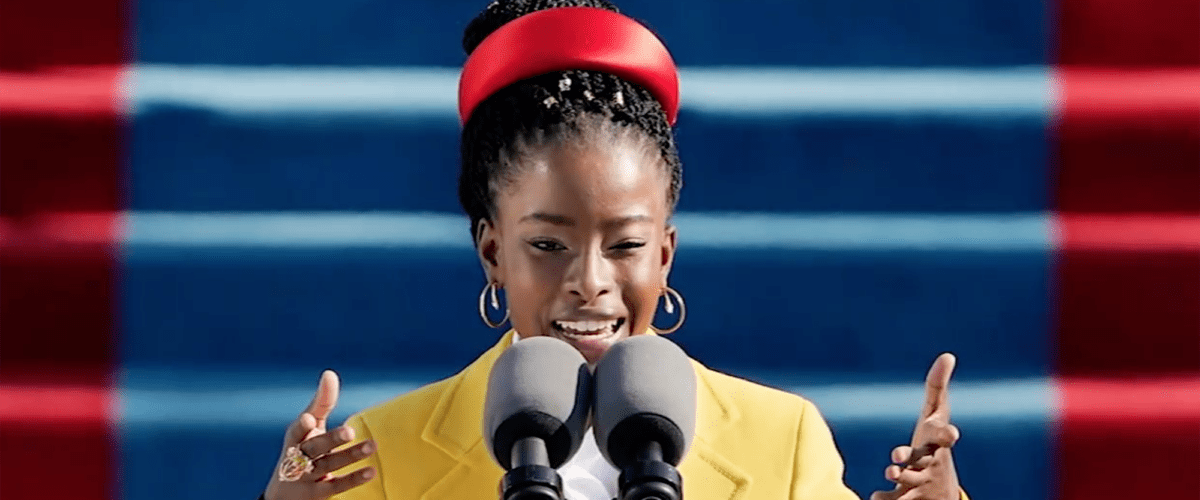The inauguration of Joe Biden as 46th president of the United States was a splendid event, despite the confinement of the pandemic. And for many of us it was a finely orchestrated ceremony that lifted our spirits only days after a devastating attack on our Capitol as an angry mob attempted to overturn a presidential election.
In the midst of this drama, bathed by the sun breaking through an overcast sky, a 22-year-old African American woman, Amanda Gorman, gave voice to her poem, “The Hill We Climb.” I was transfixed as I heard the intense, measured, beautiful cadence of her poem.
When day comes we ask ourselves,
where can we find light in this never-ending shade?
The loss we carry,
a sea we must wade.
We’ve braved the belly of the beast …
We the successors of a country and a time
where a skinny Black girl
descended from slaves and raised by a single mother
can dream of becoming president
only to find herself reciting for one…
And so we lift our gazes not to what stands between us,
but what stands before us.
We close the divide because we know, to put our future first,
we must first put our differences aside.
We lay down our arms
so we can reach out our arms
to one another.
In the rhythm of the poem, she weaves together the never-ending shade and the present moment of turning:
But one thing is certain
if we merge mercy with might
and might with right
then love becomes our legacy
and change our children’s birthright.
The emphasis is on “if.”
The poem echoes the psalms of Israel. And many of these ancient texts express profound disorientation and hopeful reorientation. These verses from Psalm 77 are an example:
In the day of my trouble I seek the Lord;
in the night my hand is stretched out without wearying;
my soul refuses to be comforted.
I think of God, and I moan;
I meditate, and my spirit faints. (Psalm 77:2-3)
This suffering lament continues unabated until the psalmist begins to turn and says, “I will call to mind the deeds of the Lord; I will remember your wonders of old. I will meditate on all your work, and muse on your mighty deeds.” And as these memories break through the psalmist’s distress and despair, a new vision unfolds. It is a vision of the Exodus when “your way was through the sea, your path, through the mighty waters; yet your footprints were unseen. You led your people like a flock by the hand of Moses and Aaron.”
The psalm expresses unrelieved disorientation, and then deep memory brings forth a vision of God’s power to lead this suffering and disoriented person through a turbulent sea of troubles to something new. In that moment of reorientation, what the newness will be isn’t at all apparent. We are left with “what if?” What if the psalmist tries to continue life as it was before this despair — to go back to the old orientation? Perhaps Amanda Gorman’s poem offers an answer:
We did not feel prepared to be the heirs
of such a terrifying hour
but within it we found the power
to author a new chapter.
To offer hope and laughter to ourselves.
So while once we asked,
how could we possibly prevail over catastrophe?
Now we assert,
How could catastrophe possibly prevail over us?
We will not march back to what was
but move to what shall be.
A country that is bruised but whole …
“We will not march back to what was” — the old orientation — she says. And that’s also where the psalm ends. The old orientation is done for. So, once delivered from disorientation what will we do?
I believe that in this country, in this day and time, the old orientation is whiteness. And Amanda Gorman’s poem challenges us to move out from under the spell of white supremacy that has dominated this country for 400 years. She says, “We are striving to forge a union with purpose, to compose a country committed to all cultures, colors, characters and conditions of man.”
This beautiful poem is about so much more than challenging white supremacy, but that is the social and cultural reality within which the poet has crafted this remarkable verse.
In this country, we’ve gone through a deep disorientation — a pandemic and four years in which a president openly promoted white supremacy to the point of inciting violence to overturn an election that he lost. This inaugural poem calls us toward reorientation. Will we engage in that reorientation? Or will we try to go back to the old one? The old orientation clings to whiteness — that social construct that locates white-skinned people at the top of the social order and all other skin colors in inferior positions.
“This inaugural poem calls us toward reorientation. Will we engage in that reorientation? Or will we try to go back to the old one?”
“Whiteness is the mortar holding together the fortress of white supremacy,” writes Robert P. Jones in his White Too Long. This fortress of whiteness has been and continues to be vigilantly defended. “Virtually nothing,” he says, “has proven too costly on the altar of its defense.”
That defense includes the Civil War, a segregated education system, Jim Crow laws enforcing segregation, real estate redlining that divides virtually all our major cities along racial lines, a criminal justice system that disproportionately kills or incarcerates millions of Black men, and state-drawn networks of barriers to restrict minority voting. Jones calls such practices the staggering ransom that whiteness has demanded to sustain itself.
It would be easy for me to point to the storming of the nation’s Capitol by a mob defending white supremacy as the orientation that must be changed. However, that would let me off the hook.
In the months after the murder of George Floyd on May 26, 2020, I realized I had just finished a strikingly white manuscript — an account of my teaching experience as a professor of pastoral theology. Fortunately, it hadn’t been published. I was a white professor in all-white seminaries, led by all-white faculties, teaching, with few exceptions, only white students. My seminary teaching was walled off from African Americans and the incalculable injustice that year after year and day after day undermined their dignity and caused them to live in fear of the power and menace of whiteness.
I discovered that you cannot dig into the meaning of whiteness without learning that racial relationships qualify everything you do — and in my case, everything you write. Even though I taught in virtually all-white seminaries, nonetheless race was a part of all we did. It was, as I can see now, inescapable. All of us were agents of whiteness, and few, if any of us, knew it.
Amanda Gorman has challenged me to continue facing up to my whiteness and to reorient myself against it. Like the psalmist, I will need God’s help to do so. She ends her poem with these verses:
So let us leave behind a country
better than the one we were left with.
Every breath from my bronze-pounded chest,
we will raise this wounded world into a wondrous one …
our people diverse and beautiful will emerge,
battered and beautiful.
When day comes we step out of the shade,
aflame and unafraid,
the new dawn blooms as we free it.
For there is always light,
if only we’re brave enough to see it.
If only we’re brave enough to be it.
The “if” with which she ends her poem is my “if” — and for those who are white like me, it is yours, too.

Richard Hester
Richard Hester taught pastoral theology for more than 20 years at two seminaries. After serving as executive director of the Georgia Association for Pastoral Care, he continued his career as a therapist at a pastoral counseling center in Raleigh, N.C., where he established the Narrative Therapy Seminar in 1997. He received two degrees from Southern Baptist Theological Seminary.


